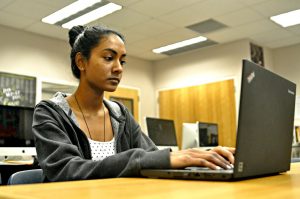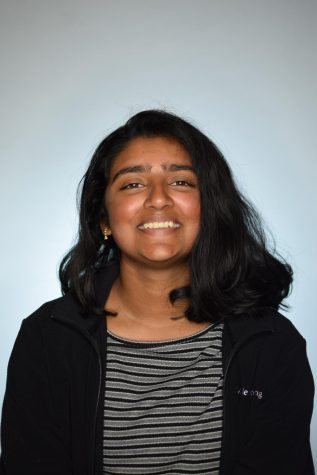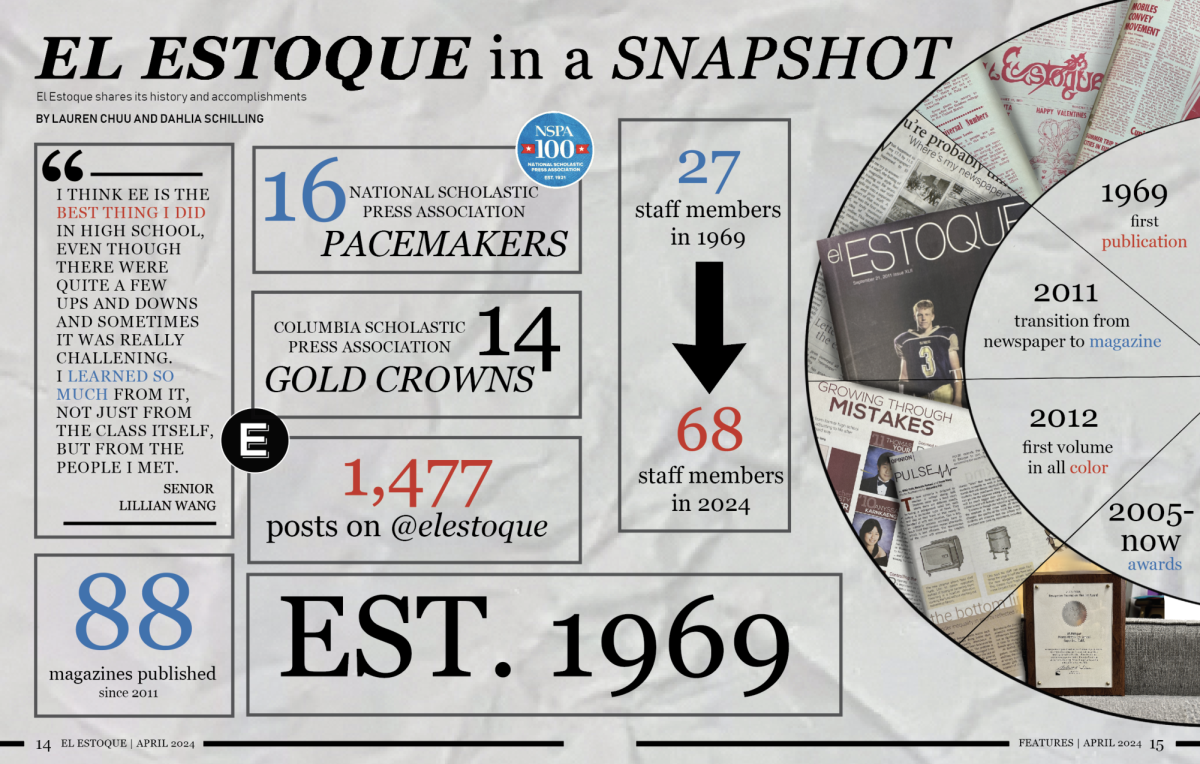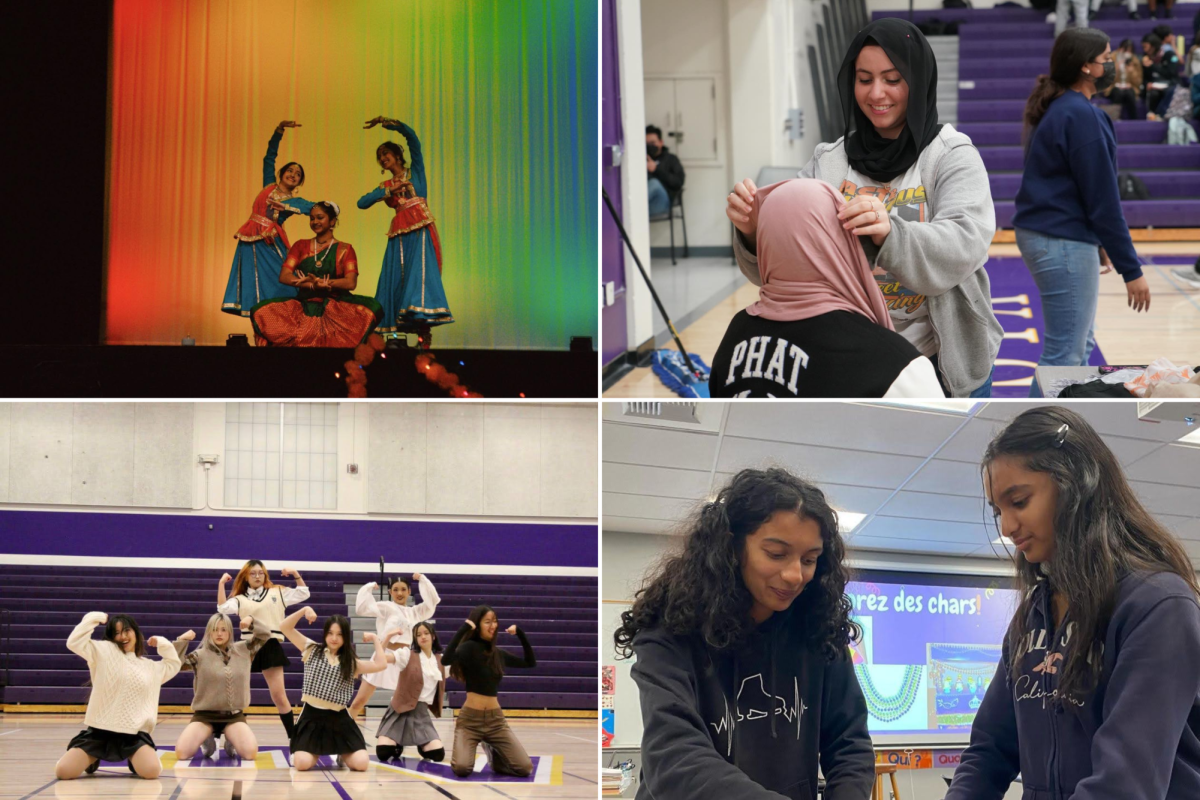One wall is plastered with vibrant college flags, while a whirlwind of pink and purple paper butterfly cut-outs cover the remaining three walls. Empty wooden tables fill the rest of the room.
A woman dressed in formalwear smiles sweetly and steps out from behind her desk to greet visitors, inviting them to sit down with her at one of the tables near her desk. The black frames of her glasses reflect the overhead lights as she introduces herself as MVHS’ college advisor, Le-Xuan Cao.
Cao has been advising students on the college application process since 1997, and currently works in room A102, the College Career Center. With an undergraduate degree in social work and graduate degree in school counseling, Cao’s career is all about helping students, specifically seniors, navigate the many moving parts of the college application process — a process that she likens to a jigsaw puzzle. Cao’s role is, in her mind, seeing what the “full puzzle” is and guiding each senior towards it.
“If they don’t see the whole picture yet, then everything feels overwhelming,” Cao said. “But once they see what all the pieces are and how they fit together, it’s not so overwhelming anymore.”
In the College Career Center, Cao observes the anxiety that students have when it comes to college applications. The more common questions she receives from students tend to relate to the Secondary School Report process. In this procedure, generally abbreviated and referred to as SSR, students must turn into the school a senior questionnaire, parent questionnaire, SSR request form and three teacher evaluations by a specific deadline—a deadline usually far ahead of each college’s actual application deadline. Cao explains that these earlier deadlines are instigated because MVHS staff needs time to put together the necessary paperwork, files, counselor or administrator interview and letter of recommendation to send to colleges for each student. Students are often confused about the dates of the deadlines, Cao says, and students don’t understand when to request SSRs or when to send only transcripts to colleges and not counselor letters of recommendation.

“It’s just the overall process itself,” Cao said. “It’s not so much that the student[s] don’t know what they’re doing. It’s how they piece [the application] together.”
Cao is there to help students with this process, and all information that students share with Cao is confidential. Her interactions with each student are largely one-on-one.
“It’s not rocket science, it’s not brain surgery, [but] it’s a lot of moving parts,” Cao said. “You still have your classes, your life, your extracurricular activities. Just imagine your life right now, and add another thing on top of that.”
Taking risks in life
Last year during volleyball tryouts, senior Theemeshni Govender tore her ACL, a ligament in the back of the knee that helps with stabilization. She spiked a ball and her feet had landed in an awkward position.
Over the course of the next 11 months, she would undergo four surgeries for her torn ACL.
Govender recalls her landing as feeling as though two things were sliding across each other. People helped her off the court, as she moved to the sidelines in extreme pain. However, after she eventually tried walking around, she found that the pain had actually lessened. She underwent a surgery for an ACL reconstruction, and certainly expected to be back on the court her senior year — a fitting end to her high school experience.
Presently, she is no longer leaping to spike volleyballs and perhaps, similar to many injury-affected athletes, the court may simply serve as a reminder of what could have been. A week after the ACL reconstruction, she was racked with high fevers and informed of an infection in her ACL. Govender underwent two more surgeries for the infection and was absent from school for two weeks, only to return with a tube in her arm — the only way for her body to consume her antibiotics was through her veins. Her antibiotics had to be administered every six hours, so her dad would come to school every day during lunch and administer the medicine.
During her third surgery, the orthopedic surgeon had inserted a tube into her arm, running across her arm and rests on the center of heart, and her dad would inject her antibiotics through the tube. The orthopedist had also “washed” out her knee to clean it of any of the bacteria from the infection, and she returned home from the surgery on the weekend, ready to return to school.
Govender remembers how naive she was after the surgery. Facing a stressful junior year, Govender didn’t want to miss any classes and considered immediately returning to school. Her parents were firmly against it and in turn, Govender was absent from school for an entire week. But, looking back on it, she’s thankful for her parents’ cautiousness, seeing as merely walking was already a challenge for her body.
When Govender returned back to school, she received a warm welcome. Her friends carried her backpack for her and teachers extended deadlines for the homework she had missed or excused her from particular assignments altogether. Govender continued physical therapy, even after she was able to walk. A nurse still visited her every week to re-clean the site around her tube, and she had vials of blood drawn for four weeks to make sure her white blood cell count was returning to normal.
Her life seemed to be looking up.
However, when Govender revisited her orthopedic surgeon again in July, before the beginning of senior year, he told her she needed yet another surgery — her fourth. The graft from her hamstring that he previously inserted had stretched.
Staying ahead of the game, Govender had planned to start her college essays over the summer and center the prompts around her injury. She eventually fell ill to procrastination, but completed several essays before the beginning of the school year. At the time, she didn’t know she would need a fourth surgery, but still felt slightly uneasy about writing of her injury.
“I want to take risks in life,” Govender said.
Her mother was all for it. The injury had and has definitely changed Govender, emotionally and physically, and her injury has affected her academic performance, and that in itself, to her mother, was worthy of colleges’ attention.
“Sometimes I feel like [colleges] don’t want you to talk about certain hardships, as they might not understand or they’ll be like ‘Oh it wasn’t that big of a deal,’” Govender said, “I didn’t want to underrepresent what happened, yet at the same time I didn’t want them to say like ‘Oh she’s using this as excuse for things that happened my junior year.’”
In lieu of simply stressing her physical situation, Govender ultimately pinpointed the emotional aspects of her injury, and wrote of the process — or roads — traveled to overcome these hardships.
And the bigger picture unfurled at the edges as she did so.
What with the intravenous medications and the four surgeries, it seemed as if the enormity of her struggles would always be crystal clear to her. However, to Govender, it didn’t seem that way.

“It’s almost as if after I recovered and I could walk again that had like pushed them [the past struggles] aside and forgotten about it,” she said. “But when I was forced to write about it, I was like ‘Wow, I can’t believe I went through all of this.’”
Regardless of the emotion concentrated in her writing, Govender said she doesn’t want to garner any sympathy. She’d never informed peers of her injuries unless they had asked specifically, and in essence, there had never been a driving reason for her to “re-travel” these emotional roads of her injury — until college applications. After all, Govender mentions, sometimes people dislike reflecting on their “past selves,” regardless if they have changed for the better or worse.
“The college [application] process definitely made me look at the entire process of my surgery and recovery,” Govender said. “Look back on it in detail. Every step.”
At first, Govender had reflected on her injury with resentment. Yet presently, in the middle of her senior year, Govender personally believes she has become much more resilient — not just physically, but emotionally too — and she’s ready to face any problem that arises in the future. She is still attending physical therapy and is just starting to jog — she hasn’t attempted running just yet. Even then, her jogging is assisted. While others’ feet may subconsciously pound the cement sidewalks, Govender can only jog with the aid of a trampoline.
“I want to take risks in life,” she said, nevertheless.
A step of life
In the very beginning, before she began to write her essays or turn in SSR forms or ask for letters of recommendation, she looked forward with excitement. For senior Sithara Menon, the prospect of leaving her parent’s home made her eager and anxious to see the world beyond Cupertino. She figured she might miss the people: her friends, her family, her mom specifically, but the prospect of independence remained too alluring to resist.
But once she began the process of writing the essays and filling out the forms that would determine where she would end up, she began to look not only towards the possibilities ahead, but also reflected on her present and past self.
“It was just kind of a little bit nerve-wracking to think about [how] these people are going to decide where I’m going to spend the next four years of my life based on one sentence that I’m writing at 2 a.m.,’” Menon said.
But the essays she has written also forced her to think more about herself and what she wants to do in life. Through the process of planning and writing the essays, Menon has found herself taking an objective look at herself.
“They ask questions that are very vague and I have to try to reflect on who I am, but I feel like I’m only 17. I don’t really know who I am yet,” Menon said, “It’s forced me to look at myself more objectively and think about ‘This is something I did, what does that show about myself?’ and it’s made me realize that I don’t really notice how other people see me or what other people think of by doing that.”

As she worked through the essays, answering prompt after prompt, Menon began to notice how independent she was and how she devoted herself completely to whatever project she had committed to.
She began to notice things she hadn’t noticed about herself before.
“I feel basically the same,” Menon said. “I guess in the fact that I’ve been forced to reflect on myself, it’s forced me to be more self-aware, but I feel like once [I] hit submit and I’m done, I’ll feel like a step of my life is done.”
Life beyond college
“I mean, define good college,” Cao said. Her eyebrows raise.
Over the years as a college advisor, Cao has noticed that students apply to more colleges now than in the past. According to a 2014 New York Times article, in 1990, only nine percent of students applied to seven or more colleges. In 2011, that number rose to 29 percent. Cao believes that the main reason students apply to so many more schools now is because of name recognition. Some students and parents may value brand schools and mentally equate applying to more schools with a higher chance of being accepted at an elite university.
Yet in Cao’s opinion, there is indeed a college somewhere for everyone. All students can get into college, but the anxiety that a student or parent may have over potential rejection by very specific, highly selective colleges adds to the stress of the application process. In her mind, community colleges are also a good option, even if some students or parents may disagree.
“It’s just perspective — what the families want, what the students want,” Cao said. “What is out there in the community that’s being shared, when parents go for a walk? Conversations that students have with one another?”
Even a large part of choosing majors, Cao has noticed, comes down to expectations: being able to support a certain lifestyle, being able to have certain initials behind one’s name are both prevalent factors in knowing which major to select. Sometimes, students will agree with their parents. Sometimes, they won’t — and if they don’t, the student can either choose to find their own path over the next four years, or compromise with their parents.
After all, the concern isn’t just about college.
“Will you be successful? Will you be okay?” Cao said. “Will you be able to have the lifestyle you want?”
“Will you be successful? Will you be okay?” Cao said. “Will you be able to have the lifestyle you want?”
Parent involvement
When senior Robert Zhou wrote about his research internship on his resume, his father noticed the similarity between the principal investigator’s last name, Zhao, and Zhou’s own last name.
His father suggested Zhou remove the investigator’s last name, for fear the college admissions officers might think Zhou was somehow related to the investigator — thus believing their family to be involved in some kind of “scandal” or conspiracy. Zhou was in complete disbelief.
While Zhou believes his father’s suggestions can sometimes be ridiculous, he knows his father has a reason for saying what he does. His father may live in China, but the 7,000 miles isn’t an obstacle; he constantly messages Zhou suggestions, regardless of whether Zhou is sleeping or in school.
“I would say the academic focus [in my family] has lessened slightly, the essay focus has gone up dramatically,” Zhou said. “[My dad] check[s] every single detail. One little thing that’s kind of wrong, [and] he goes off. At that point, I get really, really stressed.”
However, Zhou finds the self-reflection process very natural and intuitive for him. Zhou also acknowledges that him recalling his experiences has revealed how he’s matured and grown throughout the years.
For example, in writing about his experiences as a volunteer tutor at Teen Challenge, a local

youth organization that helps rehabilitate drug addicts and victims of trauma, Zhou realized he was a good teacher. He was patient with the students he was working with at the center.
“While I was teaching them, they were pretty different from high school students because they’re much older, and so they had different ways of learning that I had to adapt to,” Zhou said. “That was one of the things I learned — that I had to cater to people’s needs when I’m trying to help them out.”
All about me
When students approach Cao with questions regarding college applications, many are related to college essays, whether it’s the Common Application personal statement, University of California personal insight questions or other supplemental essays for private or out-of-state colleges. Cao suggests treating the University of California essays — four essays limited to a maximum of 350 words each — as one-on-one interviews, and says students should aim to be more direct and get to the point quickly in each of those essays. On the other hand, many out-of-state private and public schools prefer that students write creatively, Cao says.
But ultimately, the process of writing for oneself is much different than writing for a teacher. Thus, students can even ask unfamiliar individuals to read each of their essays, asking: What did you learn about me?
“Approach each college essay as a journal entry,” Cao said. “Brag about yourself. It’s your time to shine. I, I, I, me, me, me. [This is] when it’s all about me, me, me.”
One more piece of advice
Cao’s own college application was imbued with much more of a happy-go-lucky mindset, as Cao describes her high school self as clueless — but she marched to the beat of her own drum, and knew what she wanted to do. She never studied for the SAT, applied to three colleges, was accepted to all three, chose one and was done. She lives by the quote: “Do what you love to do.”
She recalls her parents asking her, what the heck is social work? Cao explained to them, and trudged on.
It wasn’t until a few years later that she transitioned from social work to school counseling. She had been helping nieces and nephews with their college applications and realized she enjoyed, and had more fun, working with students.
“It’s a rite of passage, transitioning out of high school,” Cao said.
And among others, one of Cao’s most important pieces of advice for students is only one word: Breathe.






















